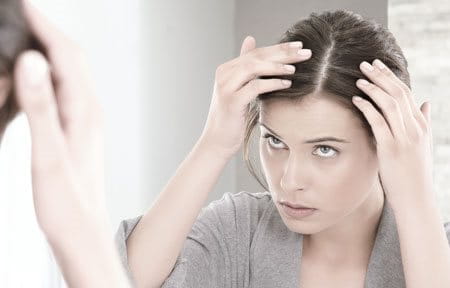Hereditary hair loss is the most common form of thinning hair and hair loss in men and women. Also known as female pattern or, male pattern hair loss, or androgenetic alopecia, it occurs when the hair follicles have a genetic sensitivity to androgens – the male sex hormones – and to dihydrotestosterone (DHT) in particular. When DHT interacts with the hair follicles, this sensitivity causes hair growth to slow or stop, leading to thinning hair or hair loss. In addition, especially in female pattern hair loss, other causal factors are involved.

Choosing the Right Shampoo for Hair Loss
Hair loss can be a distressing experience for both men and women. It can dent one’s confidence and self-esteem. While there are various reasons for hair loss, including genetics, hormones, and medical conditions, using the right shampoo can be an effective part of your hair loss prevention and treatment strategy. In this article, we will explore the world of shampoos for hair loss, their ingredients, how they work, and provide recommendations on how to choose the best one for your needs.

Understanding Hair Loss
Before delving into the specifics of shampoos for hair loss, it’s crucial to understand the common causes of hair loss. Hair loss, or alopecia, can be attributed to a variety of factors, including:
- Genetics: Family history plays a significant role in determining your susceptibility to hair loss.
- Hormonal Changes: Hormonal imbalances, such as those that occur during pregnancy, menopause, or due to certain medical conditions, can trigger hair loss.
- Medical Conditions: Conditions like alopecia areata, thyroid disorders, and autoimmune diseases can cause hair loss.
- Diet and Nutrition: Inadequate nutrition or a diet lacking essential nutrients can weaken hair follicles.
- Stress: High levels of stress can lead to hair shedding.
- Environmental Factors: Exposure to pollutants, harsh hair products, and excessive heat styling can contribute to hair loss.
- Age: As we age, hair naturally becomes thinner.
Discover the secret to maintaining your gorgeous locks and preventing hair loss with FoliPrime!
Understanding Shampoos for Hair Loss
Shampoos for hair loss are specially formulated to address the underlying causes of hair loss and stimulate hair growth. These shampoos typically contain key ingredients that target specific aspects of hair loss.
Choosing the Right Shampoo for Hair Loss
When searching for the best shampoo for hair loss, keep the following factors in mind:
- Ingredients:
- Hair Type
- Sensitivity
- Brand Reputation
- Consult a Professional
- Consistency
Conclusion
Shampoos for hair loss can be a valuable addition to your hair care routine. While they may not provide miraculous overnight results, they can play a vital role in promoting hair growth and reducing hair loss when used in conjunction with a comprehensive approach to hair health. Remember to choose a shampoo that suits your specific needs, and be patient as you wait for the positive changes to take place. Hair loss can be challenging, but with the right care and products, you can take steps toward maintaining a healthy and vibrant mane.
Major causes of thinning hair and hair loss

You can inherit this trait from either your mother’s or your father’s side of the family. And while hair loss or thinning hair is often thought of as something that only affects older people, the condition can start as early as your teens, 20s or 30s.
Most people experience some hair thinning as they age, but not everyone is affected to the same degree.
Men with male pattern baldness usually develop a receding hairline, hair loss at the crown, or both. Over time, men with hereditary hair loss can end up becoming completely bald.
Women with female pattern baldness, on the other hand, tend to develop thinning hair as opposed to total hair loss. This usually sees their hair become thinner across the scalp, especially at the hairline. The crown may be affected, but hereditary hair loss in women rarely proceeds to total baldness.
Microinflammations of the scalp are also a leading contributor to hair thinning and hair loss. They occur when the skin around your hair follicles becomes inflamed and weakens the hair root, making you more vulnerable to hereditary hair loss.
As hair growth is an extremely energy consuming process, it is also very susceptible towards shortages of energy supply to the hair follicle.
ABNORMAL HAIR LOSS: SIGNS TO WATCH FOR
Hair loss can be sudden and drastic, making it difficult to come up with an explanation. Monitor when and how your hair falls out. Do you find more hairs in the tub after a shower? Or in the morning on your pillow? Does your hair seem to be getting thinner as if losing its volume? You should pay attention to these warning signs, as they could indicate diffuse hair loss.
DERMATOLOGISTS SPECIALIZING IN ALOPECIA AND THE SCALP
Hair loss is a common reason for consulting a dermatologist. While it is considered to be a benign condition, it can cause significant psychological distress. You should, therefore, seek advice from a healthcare professional as soon as possible. Addressing the problem quickly will help prevent any more damage.
You may also find it helpful to consult a psychologist or sophrologist to gain a better understanding of the phenomenon.